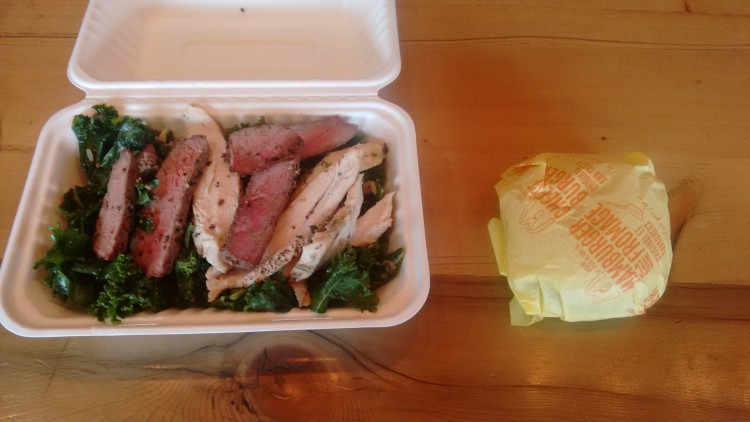Just in case you’ve been living under a rock for the last decade or so, weight related illness is a big problem globally. It’s not just those obese Americans anymore, Australia, Canada and France have also seen steady increases in obesity rates.
The alarming increase in our collective waistline’s has created an EXPLOSION in the health and fitness industry – especially in the exercise and weight loss arena.
Typing ‘weight loss’ into Amazon.ca produces over 83,000 books, with more titles being added every day. With so much content and opinion being produced on such an important issue, it can be hard to know who to listen to and what’s the right thing to do to eat healthy (and what’s the wrong thing to do).
One concept that became extremely popular in the last 20 years is calorie restriction diets.
Driven by the weight of the obesity epidemic (haha, puns…) and the new media driven movement now known as #fitspiration, counting calories became a routine and reasonable method of losing weight. The new mantra of fitness and nutrition experts was “calories in, calories out”… And there are a ton of experts still saying this.
The theory is that to lose weight, its as simple as consuming less calories than what we expend through physical exercise. Pretty simple right?
Unfortunately, not really.
The big hole in this theory is that it way-oversimplifies the concept of a calorie…
You see, a calorie is simply a unit of measure, no different from a mile, a litre or a kilogram. Instead of measuring distance, volume or weight, a calorie is the measure of energy contained within a given food.
Now think about this for a second: is there a difference between walking a mile on flat ground vs a mile straight up a mountain? Absolutely! The distance (1 mile) is only one factor, but the quality of that mile (whether its on flat ground vs. up a mountain) is a super important detail.
It turns out the same is true for calories… they are not created equally.
Calories come from macronutrients: the carbohydrates, proteins and fats that are the building blocks of your food. Alcohol is also now considered a unique source of calories – it stands in its own category because alcohol is devoid of vitamins and minerals. You may have heard these referred to as ’empty calories’.
Common sense (and now some developing research) is telling us that obviously all calories are not equal. 300 calories from a salad is clearly very different from the 300 calories in a Macdonald’s cheeseburger. Biologically these two foods have a very different effect on the body.
Also, a calorie’s worth of protein has very different effects on the body when compared to a calorie’s worth of fat, carbohydrate or alcohol. They are broken down and utilized by the body in different ways, and have different metabolic effects. Because of this, a high protein diet can have very different health and fitness outcomes compared to a high carbohydrate diet, even when the number of calories consumed and burned is identical.
The freshness and quality of your food source matters as well. Obviously a freshly picked, organic apple has a dramatically different effect on your body compared to a twinkie (both have about 130 calories and both are mostly carbohydrate). But you may not know that fresh, local fruits and vegetables are much better for us that frozen and imported produce. We know that the longer it takes to get fresh food to us from the farm, the more the nutrients in the food slowly decrease. So even if the calorie count remains similar, nutritionally these two groups can be worlds apart. For more on the importance of freshness, Dr MacPhee wrote a great article on this, which you can find HERE.
Finally, calorie restriction diets may actually be the worst thing for you if your goal is to lose weight.
If your body thinks that its starving (because you’ve limited your food intake to a level that’s lower than your exercise level), your body goes into survival mode, one aspect of survival mode being fat storage and retention. For a more detail discussion on this topic, you should check out this blog by Mike Sheridan.
So now what?? If eating less isn’t going to help you lose weight, what can you do?
Well, for starters, click HERE to sign up for the next Eat By Design Seminar to get a comprehensive breakdown of good foods, bad foods, as well as some myth busting info addressing misconceptions around cholesterol, fat and more.
Can’t wait that long? Sign up for the Eat By Design 30 Challenge (it’s FREE!) to receive daily videos and resources walking you through the process one step at a time.
 Dr. David Hawkes is a wellness expert and martial arts enthusiast. Born and raised in Perth, Western Australia, Dr Hawkes’ passion for health and wellness has led him here to Kanata, literally halfway around the world. After graduating from Murdoch University, Dr. Hawkes ran a successful practice in Perth’s western suburbs before moving to Ottawa. Dr. Hawkes has a special interest in family wellness, as well as Peak Performance. He is passionate about helping individuals and families lead their extraordinary lives.
Dr. David Hawkes is a wellness expert and martial arts enthusiast. Born and raised in Perth, Western Australia, Dr Hawkes’ passion for health and wellness has led him here to Kanata, literally halfway around the world. After graduating from Murdoch University, Dr. Hawkes ran a successful practice in Perth’s western suburbs before moving to Ottawa. Dr. Hawkes has a special interest in family wellness, as well as Peak Performance. He is passionate about helping individuals and families lead their extraordinary lives.
